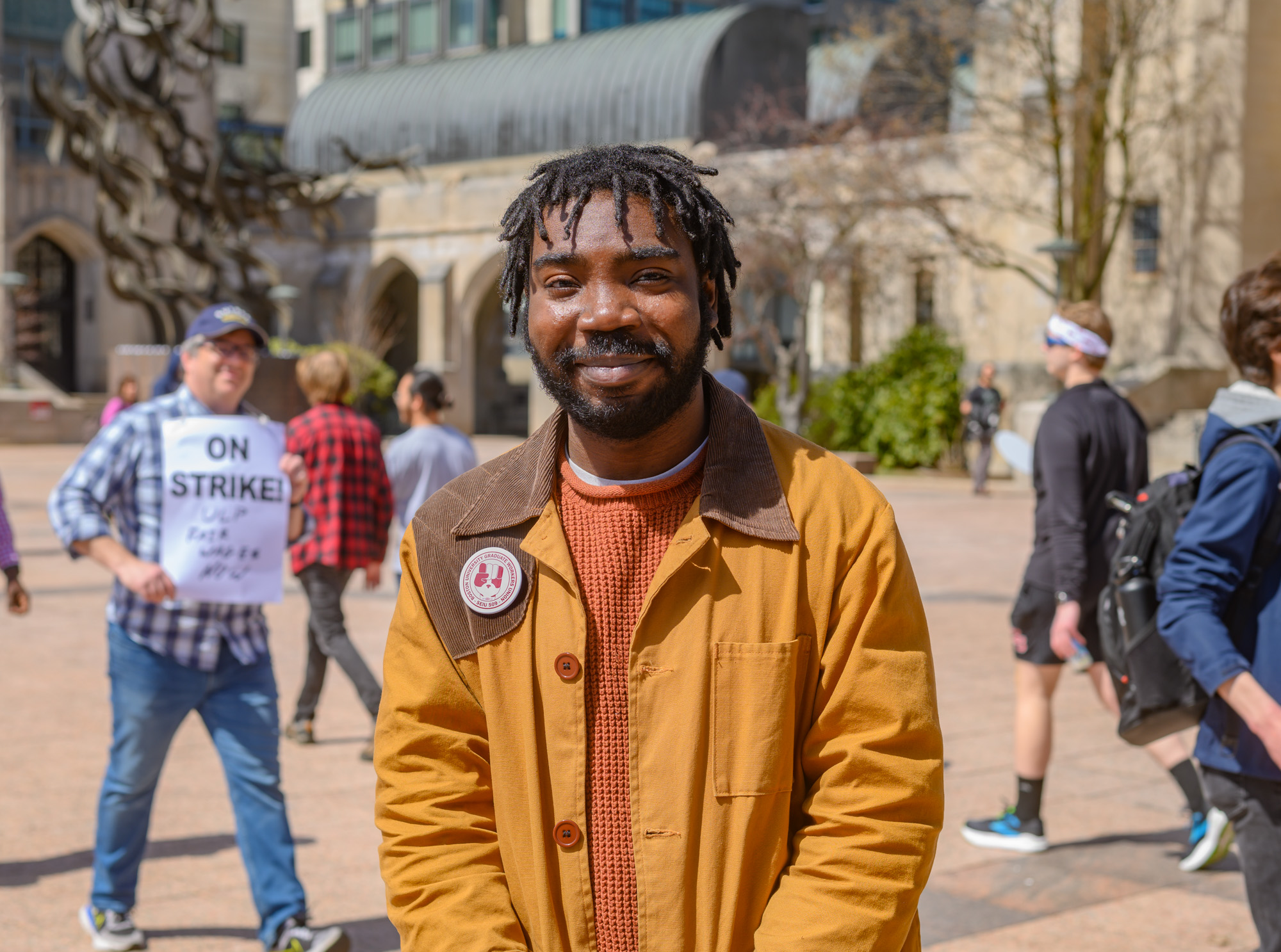See more Daily Free Press coverage of the BUGWU strike here.
As the Boston University Graduate Workers Union approaches its third week on strike in support of higher wages and increased benefits, university policies continue to negatively affect their ability to teach, work and live in the city of Boston.
BU’s current policies impose a mental burden for striking graduate student workers, said Lauren Rains, a second-year PhD student in the Graduate School of Arts and Sciences.
“Receiving the pay that you’re receiving, it is such a mental exhaustion that truly impacts teaching,” said Rains, who was a teaching fellow for a history course this semester. “It’s really hard for me to focus because I’m constantly working and then I come home and it’s never enough.”
Besides pay, a principle issue for graduate workers is the lack of dental insurance included in the medical insurance plan they receive through BU — an area of particular contention for James Brueckel, a second-year PhD student in the history program.
“I’m looking at $2,000-plus dental bills soon,” he said. “Without any insurance, it’ll be a tall order to cover that bill.”

Nana Boateng, a third-year law student and research assistant at BU School of Law, said he is committed to the work he does at BU, but struggles with not receiving proper compensation. He compared BU to University of Massachusetts-Amherst, which increased its graduate workers’ wages to a minimum of $32 an hour as of the 2022-2023 academic year.
“The work that I do contributes to work that gives BU prestige and brings in dollars,” Boateng said. “It’s money that I’m not necessarily seeing, even though I’m contributing to that.”
As of the start of the strike, BU’s graduate workers received $15 an hour as part-time workers, and their stipends ranged from roughly $26,000 to $40,000.
In the neighboring city of Cambridge, graduate workers at Massachusetts Institute of Technology are allocated stipends ranging from $43,000 to $56,000 a year, according to MIT’s Office of Graduate Education. Harvard University raised its stipend for some of its graduate workers to $50,000 a year, the Harvard Crimson reported in December.
Meanwhile, just across the river in Boston, Rains said she often has to forgo healthy food because she is unable to afford it.
“I definitely skip out on more healthy foods if it’s more expensive,” she said. “I don’t really eat out at all, and if I do it would be McDonald’s.”
Graduate workers also dispute their classification as part-time workers. Responsibilities outside of the classroom, like meeting with undergraduate students, make their jobs “24/7” gigs, Rains said.
“I do not know a single person that works only 20 hours a week,” she said.
Brueckel described graduate workers as embodying a gray area between students and employees. Although graduate workers are technically only part-time workers, they are not allowed to pursue other employment, which leaves them struggling to pay basic expenses such as groceries, rent and healthcare.
“Regardless of how you classify us, we need to be able to make enough to live decent lives,” he said.
Boston’s rent prices climbed by 12% in 2023, according to the Boston Globe. Increased cost of living combined with comparatively low stipends have forced some graduate workers to seek affordable housing as far away as Quincy, Brueckel said — a development which makes it difficult for graduate workers to meet with students.
For graduate workers, the alternative to braving Boston’s housing market is choosing to live in BU’s graduate housing facilities. But, according to Brueckel, tenants sometimes spend upwards of 70% of their stipend every month on rent.
The thin paycheck graduate workers receive means Boateng relies predominantly on loans.
“Most of the income that I’m living on right now is from my loans,” he said. “That’s partly because my pay is so low.”
As graduate workers push for better pay, healthcare and recognition, the Provost’s office is directly asking graduate workers to report their participation in the strike.
Rains said she receives emails asking her to self-report her participation in the strike “two to four times a day.”
Under the National Labor Relations Act, employers cannot legally ask specific employees if they are striking without first negotiating collectively with the union.
BUGWU filed an unfair labor practice charge on March 26 alleging that BU violated the NLRA by requiring graduate workers to announce their participation in the strike, said a spokesperson for the union who requested to remain anonymous. The ULP is one of eight charges BUGWU has filed against BU with the National Labor Relations Board over the course of seven months of negotiation.
“It’s not required by law for us to fill out those forms,” Brueckel said. “That’s totally our right to not report on ourselves.”
The Office of the Provost had previously asked faculty and department administration to report any graduate workers on strike to the Provost’s office, yet it recanted the request following a successful petition signed by over 160 members of BU’s faculty and staff.
Anita Patterson, an English professor in the College of Arts and Sciences and GRS, signed the aforementioned petition and donated to the BUGWU support fund.
“I think about the strike a lot. It’s impossible not to,” she said. “Having been [a graduate student] myself, I know what it’s like trying to live on that kind of salary in a major metropolitan area.”
As negotiations between the union and the university continue, the BUGWU has established a worker support fund, which has raised more than $90,000 dollars of its $250,000 goal.
Rains said that BU does not recognize the negative impact its current policies, especially wages, have on graduate workers.
“Obviously, PhDs are meant to be overwhelming and stressful, but I think that that on top of the constant financial stressors outside of that is just too overwhelming for us,” Rains said. “It’s to the point where it’s unmanageable.”



























































































































